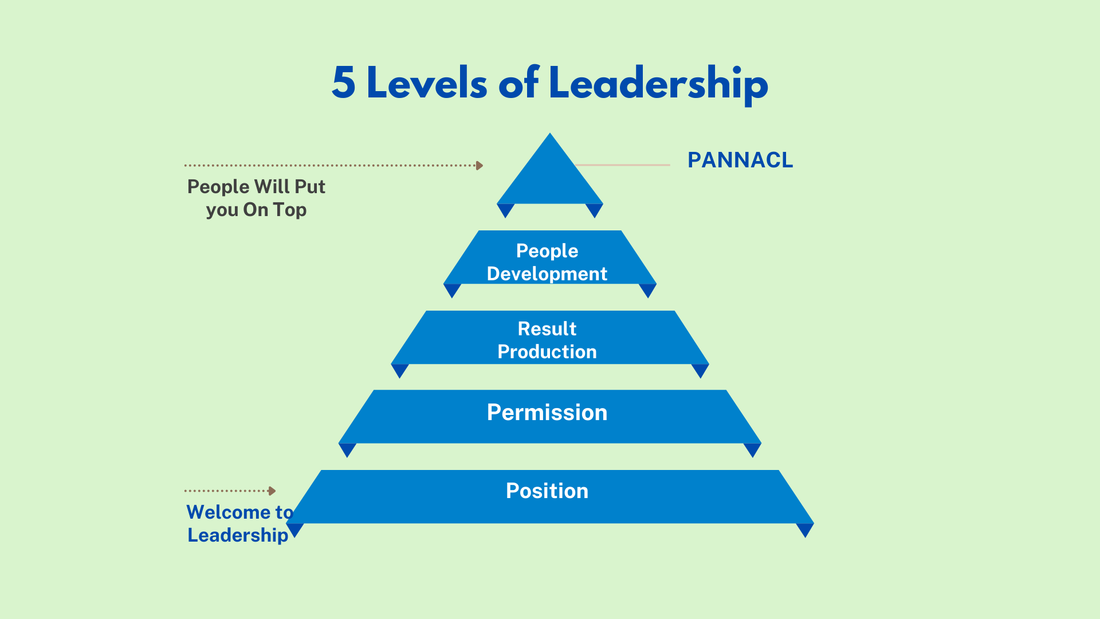
The 5 Levels of Leadership for Project & Program Managers
Share
Leadership in project and program management goes far beyond schedules, budgets, and deliverables. Projects succeed or fail not only on technical expertise, but on how well the manager leads people, influences stakeholders, and builds trust. John C. Maxwell’s 5 Levels of Leadership offers a practical framework that project and program managers can use to grow their influence, earn respect, and drive results.
Let’s explore how each level applies directly to the project environment.
Level 1:
Position – People Follow Because They Have To
At this stage, authority comes from the title: Project Manager or Program Manager. Team members follow instructions because of organizational structure, not personal influence.
- For Project Managers: You are officially responsible for deadlines, scope, and budgets.
- Pitfall: Team members comply, but they don’t commit. They may deliver tasks but lack motivation or creativity.
- How to Grow: Focus on learning strong project management fundamentals (PMI standards, scheduling tools, risk registers). Establish credibility by being organized, reliable, and fair.
Level 2:
Permission – People Follow Because They Want To
Here, leadership shifts from authority to relationships. Project team members and stakeholders willingly collaborate because they respect you as a person.
- For Project Managers: Trust and open communication make it easier to resolve conflicts and negotiate stakeholder demands.
- Example: A team member volunteers extra effort during a deadline crunch—not because you demand it, but because of mutual respect.
- How to Grow: Practice active listening, empathy, and DISC-based communication. Spend time understanding individual motivators and building rapport across functions.
Level 3:
Production – People Follow Because of What You Have Done for the Organization
This level is about delivering consistent, visible results. When projects succeed under your leadership, your reputation grows.
- For Program Managers: Delivering strategic benefits (not just outputs) elevates your standing. Executives trust you to lead critical initiatives.
- Key Traits: Driving performance, aligning project objectives with business outcomes, and demonstrating problem-solving during crises.
- How to Grow: Develop skills in portfolio alignment, benefit realization, and stakeholder influence. Document and communicate wins.
Level 4:
People Development – People Follow Because of What You Have Done for Them
At this stage, you’re not just managing projects—you’re developing people. Team members grow their skills and careers because of your coaching and mentorship.
- For Project Managers: You invest time in mentoring junior engineers, analysts, or coordinators. They become more independent and effective, which strengthens the team.
- For Program Managers: You help project leads grow into program leaders, building a pipeline of capable managers.
- How to Grow: Incorporate mentoring and coaching into your leadership style. Share knowledge generously, delegate meaningfully, and recognize achievements.
Level 5:
Pinnacle – People Follow Because of Who You Are and What You Represent
Few reach this level, but those who do leave a legacy. At Level 5, influence extends beyond projects—you shape the culture, inspire future leaders, and set new standards for excellence.
- For Senior Program Managers / PMO Directors: You are recognized as a thought leader. Others seek your guidance even outside your formal responsibilities.
- Impact: You inspire trust at the executive level, gain stakeholder alignment across organizations, and elevate the reputation of project management as a discipline.
- How to Grow: Focus on vision, legacy, and contribution to the profession—through thought leadership, teaching, or shaping organizational strategy.
Final Thoughts
Project and program managers rarely move smoothly from one level to the next—it’s a journey of growth. Titles may grant authority, but authentic leadership is earned through trust, results, development of others, and legacy.
The challenge is to ask yourself regularly:
- Am I leading only by title?
- Am I building trust and relationships?
- Am I delivering results that matter?
- Am I developing others to succeed?
- Am I leaving a leadership legacy?
Excellent project and program managers climb these levels not just for career advancement, but to create lasting impact in their organizations.
